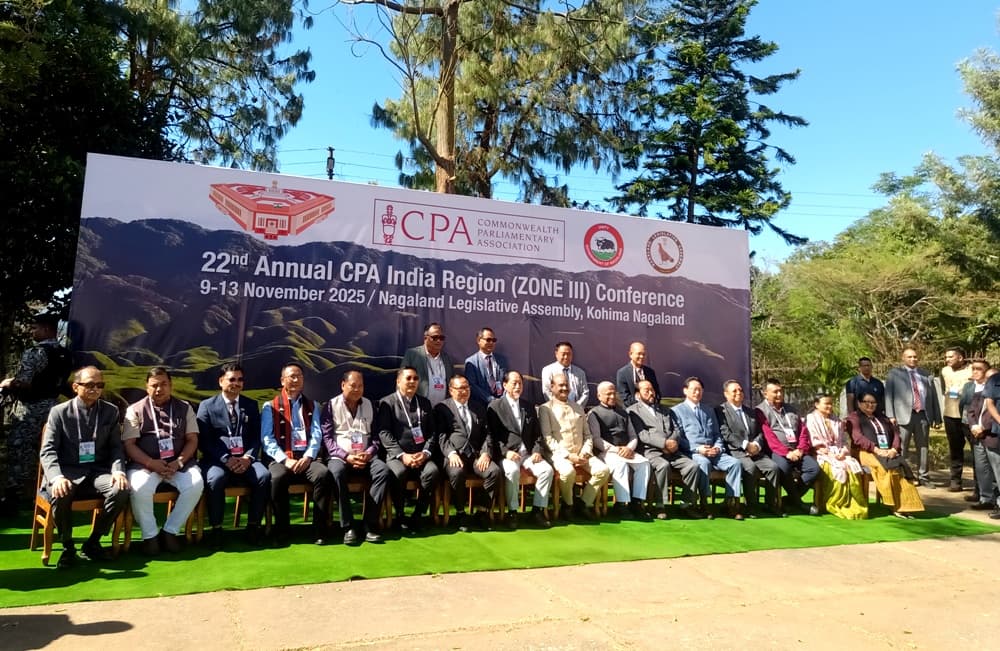Nagaland CM Neiphiu Rio highlights investment, connectivity, and institutional gaps at the CPA Zone-III conference, urging focused development support.
Share

KOHIMA — Chief Minister Neiphiu Rio on Monday said that the re-imposition of Protected Area Permit (PAP) regime in Nagaland, Manipur and Mizoram has contributed to growing hesitation among potential investors exploring opportunities in the region.
He was speaking at the inaugural session of the 22nd annual Commonwealth Parliamentary Association (CPA) India Region Zone-III conference at Nagaland Legislative Assembly (NLA) Kohima. The conference, hosted by the NLA, is being held from November 9 to the 13th.
According to Rio, the PAP restrictions—combined with limited connectivity, absence of national institutions, and existing regulatory restrictions—continue to hinder long-term sustainability and growth in Nagaland. These constraints, he said, have widened the gap between the state and the rest of the country in areas such as industrial development, research institutions, and economic diversification.
He said it was “imperative that focused attention and special consideration be accorded to Nagaland” in infrastructure, connectivity, education, and institutional development, which would provide citizens equal opportunities to contribute to national progress.
The chief minister said that the CPA India Region Zone-III has played a consistent role over the years in strengthening regional cooperation, improving legislative practices, and promoting shared learning. He urged the body to continue shaping policies that support inclusive development and deeper integration of the Northeast with the rest of India and neighbouring regions.
Also read: Om Birla arrives in Dimapur, lauds Nagaland’s culture ahead of CPA meet
Rio said that Nagaland continues to remain a resource-constrained state despite being endowed with minerals such as cobalt, nickel, natural gas, and petroleum. He added that oil exploration remains sub judice, and the state government will proceed according to the court’s decision. This situation, he said, has limited Nagaland’s ability to harness its natural wealth for economic development.
Rio recalled that he had written earlier to the prime minister to establish an Indian Institute of Science Education and Research (IISER) in Nagaland.
He said that the late Arun Jaitley, then Union Finance Minister, had announced the setting up of an IISER in Nagaland in the Union Budget of 2015–16, but the project “could not be materialised.”
He maintained that an IISER would be “transformational” for the state and the region, especially in strengthening science and mathematics education and research. The state government has already acquired 200 acres at Sukhovi in Chümoukedima, located near Dimapur Airport and Sukhovi Railway Station. Rio urged the Centre to reconsider and expedite the IISER proposal.
He added that the Nagaland Institute of Medical Sciences and Research requires sustained institutional strengthening. Rio appealed for it to be upgraded to an AIIMS-like institution or a central institute along the lines of RIMS Imphal, to improve access to advanced healthcare and medical education for Nagaland and neighbouring states.
Push for railway and air connectivity
Rio said that Nagaland currently has only about 8 kilometres of railway line within its territory. The proposed 250-kilometre Dimapur–Tizit railway line, he said, would connect Dimapur, Wokha, Mokokchung, Longleng, and Mon districts, cutting across mineral-rich and agricultural belts. The project was first announced in the Railway Budget of 2011–12 but has seen slow progress. He urged the Union government and the Ministry of Railways to accord priority to the line.
On air connectivity, Rio said that the Airports Authority of India had conducted feasibility studies and prepared Detailed Project Reports for the proposed Ciethu Airport in Kohima in 2008 and 2022. However, in correspondence dated June 5, 2025, the proposal was not approved by the government of India due to lack of budgetary provision for greenfield airport projects. He appealed for reconsideration, stating that improved air connectivity is essential for accessibility, trade, and tourism.
Rio added that Nagaland currently has no national institute of repute, such as an IIT or National Law University. Establishing such institutions, he said, would strengthen higher education, retain talent, and support long-term development goals.
‘Zone III among most active,’ says Om Birla
Lok Sabha Speaker Om Birla said that the Northeast has long been recognised for its cultural richness, diversity, and democratic values. He described Zone-III of the CPA as one of the most active zones, noting that it regularly convenes conferences across legislative assemblies in the region, contributing to capacity building and strengthening legislative institutions.
He said that the assemblies of the Northeast have consistently taken collective decisions reflecting the needs of their regions, helping shape policies aimed at prosperity and progress. Birla added that infrastructure improvements across the Northeast have opened new opportunities and that legislative bodies should continue focusing on regional development and industrial growth.
He said that policies must promote industrial advancement while supporting local arts, cultural practices, and traditional crafts.
Birla added the people of the Northeast deserve greater opportunities to realise their potential and that collective dialogue and public participation can help frame policies centred on inclusive and sustainable development.
NE a future hub of connectivity, says Harivansh
Rajya Sabha Deputy Chairman Harivansh said that the country recognises the Northeast as an emerging hub for economic activity, trade, and connectivity. He said that the region’s rich ecology makes it comparable to “the lungs of the earth,” similar to the Amazon rainforest. While development is essential, he said it must be balanced with environmental considerations, especially given the increasing natural disasters in the ecologically sensitive region.
Harivansh said that there is a concerted effort at both state and national levels to promote sustainable tourism in the Northeast. “Be it parks, caves, natural waterfalls, forests, root bridges, valleys, the Northeast is a living example of what being in touch with the nature means”, he said.
With 650 indigenous species of medicinal and aromatic plants and 46 species of bamboo, he said that Nagaland has significant potential for economic growth while maintaining ecological balance.
During the inaugural session, the welcome address was delivered by Sharingain Longkumer, Speaker of NLA, while the words of gratitude were shared by KG Kenye, Minister of Parliamentary Affairs.